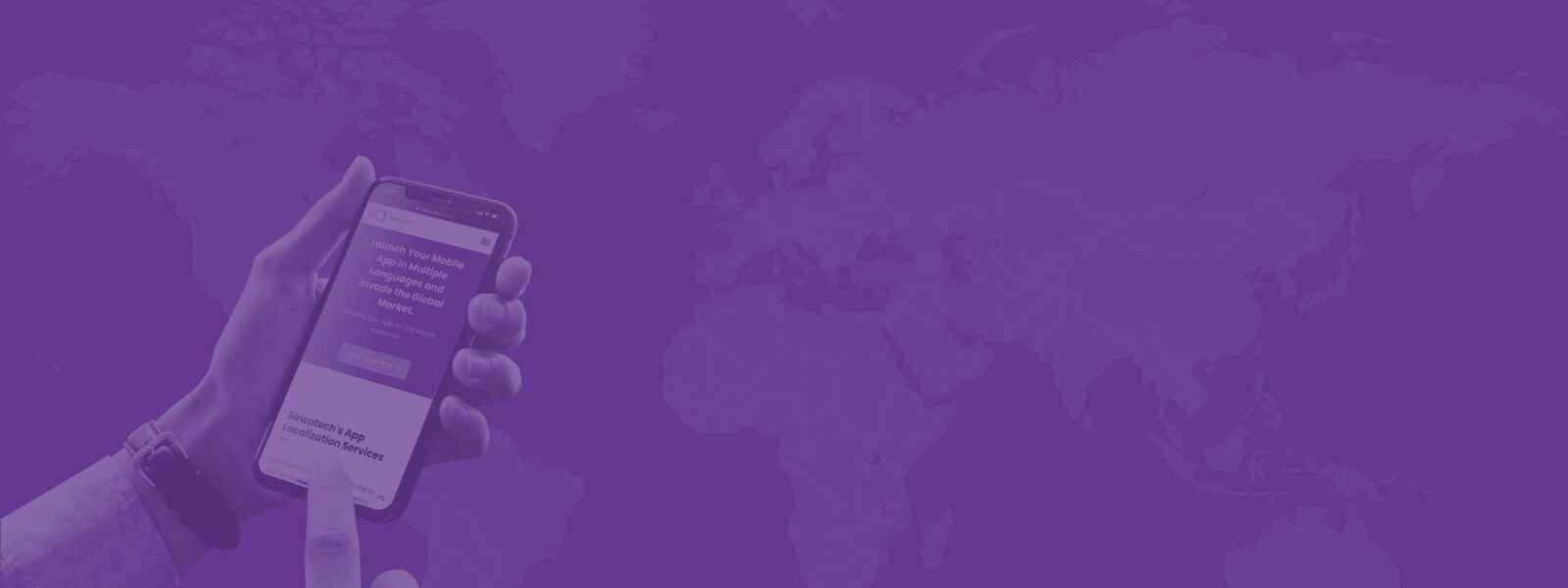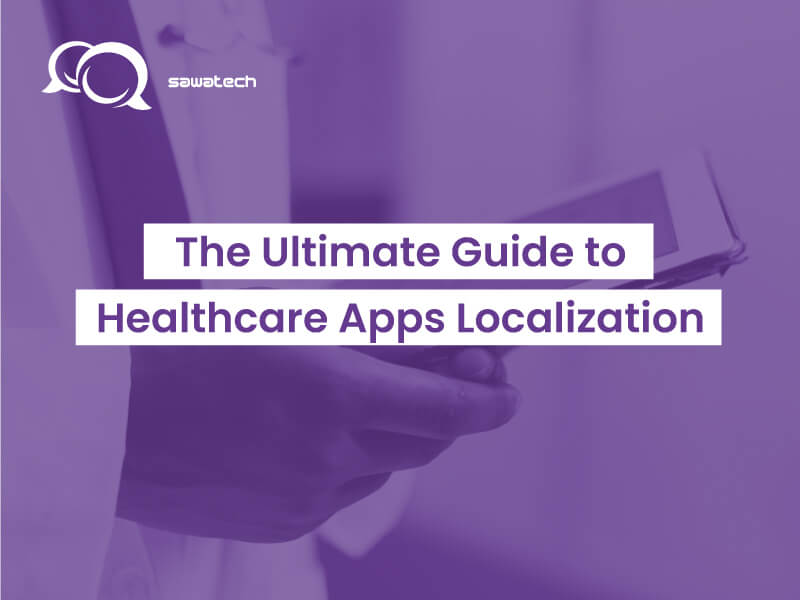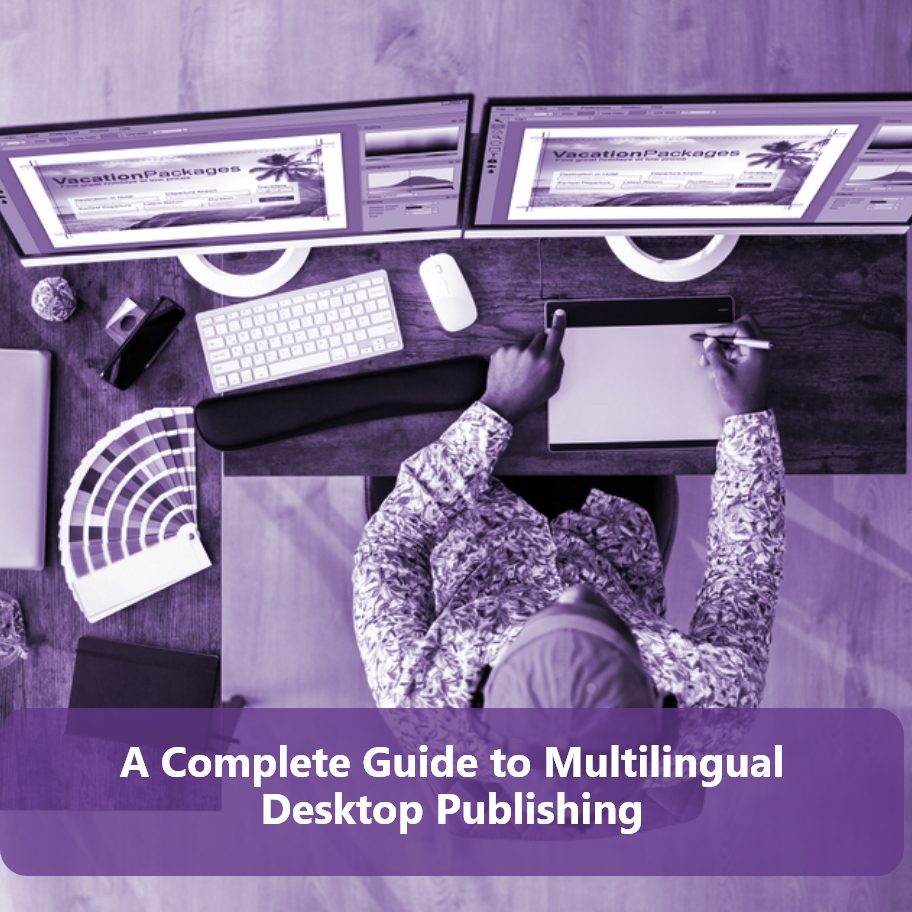In fact, according to PubMed, the number of healthcare apps exceeded the expected growth percentage in the IOS apps market by 29.9% right after the pandemic.
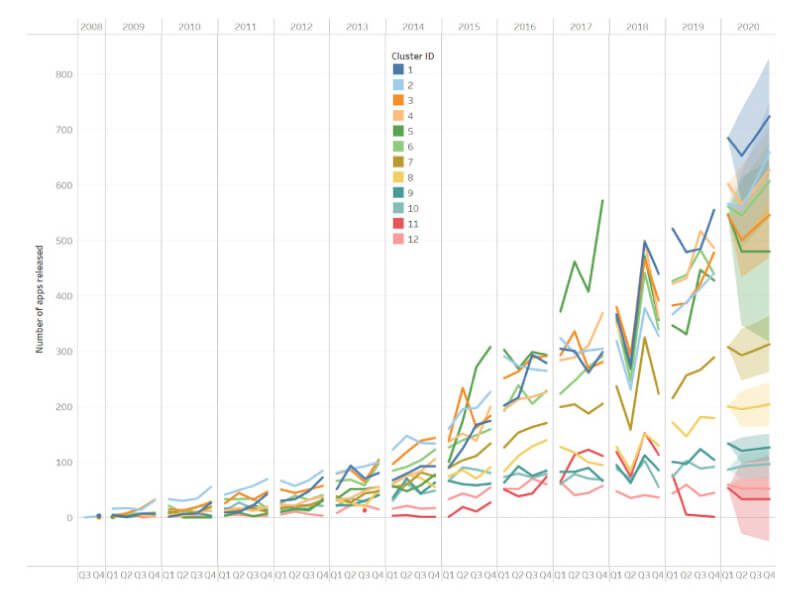
However, the problem persists. Most of those apps are not for everybody, simply because of the language barrier. The content is either in English or the language of the country where the app is developed.
In other words, they might not feature multi-language content, making it tough for people who speak different languages around the world and limiting the growth potential of apps. Accordingly, app owners remain unable to gain valuable ROI within international markets.
If this rings any bells for you, you’ll need to know about healthcare app localization. The approach allows you to take over different markets. If that sounds like something you want, then keep reading!
[/vc_column_text]
Types of Healthcare Apps Localizations
There currently are many different Health and Fitness apps in the market that serve different purposes. They aim to provide all kinds of users with health services that suit them.
They provide different services and address many different potential customers. Some of the remarkable examples are:
- Doctor On-Demand Apps
- Doctor’s Appointment Booking Apps
- Medical Record Apps
- Reminder Apps
- Nutrition and Weight Loss Apps
- Fitness Apps
- Women’s Healthcare Apps
- Mental Health Services Apps
- Chronic Diseases Management Apps
- Pharmacy Delivery Apps
Each of these apps serves a different need and would require a different and unique localization plan. No two apps are localized the same!
What Is Healthcare Apps Localization?
Before discussing the importance of localization in the healthcare apps industry, let’s first take a look at localization and understand what it entails.
Many people wonder if translation and localization are the same thing, merely translating the content into another language.
The answer is no, localization is much more than that.
Localization is the process of adapting your app to match the linguistic, cultural, and technical preferences of your target audiences across different regions and countries.
This means that to localize your app, you’ll need medical translation for your app content, DTP publishing and UI/UX localization for the layout and design of your app, and much more.
For instance, localizing your healthcare app will also require the localization of measurement systems, date formats, and different types of images and symbols. That’s because the cultures of different countries influence those aspects, among others, greatly and they vary across different locations.
For example, the USA uses the imperial system, not the metric system, and uses MM/DD/YYYY date format. Those systems aren’t commonly used in other countries and would require localization.
That’s why each localization experience is different from the others.
Localization’s goal is to adapt your product to the different markets, and so the localization plan ought to be flexible and take into account the specific needs of every region and target audience.
To Localize or Not to Localize: 5 Reasons Why You Should Localize Your Healthcare Apps
You might wonder, if healthcare apps are already this successful, why would I choose to localize?
That’s a good question.
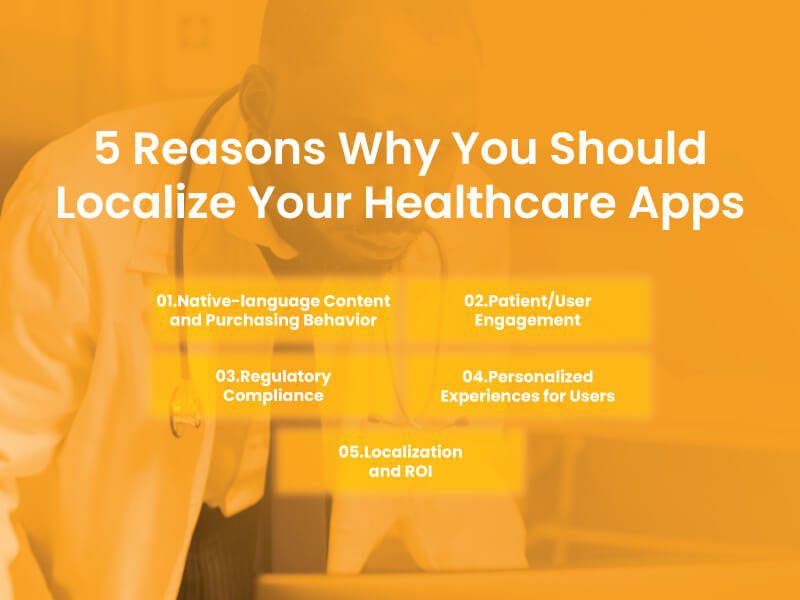
1. Native-language Content and Purchasing Behavior
Although Health apps are already so famous, they fill the gaps in some markets more than others. The African Continent for example still needs more healthcare apps in the African languages, so localization gets you way ahead of local competitors.
Another good question is: There are more than 1.5 billion English speakers worldwide, why should I localize my app, then?
Although a great segment of the population speaks English either as a native or second language, the data suggests purchasing decisions are very much related to the content’s language.
Common Sense Advisory surveyed 2430 web users in 8 countries to study the effects of language on purchasing decisions. Their data analysis tells us that:
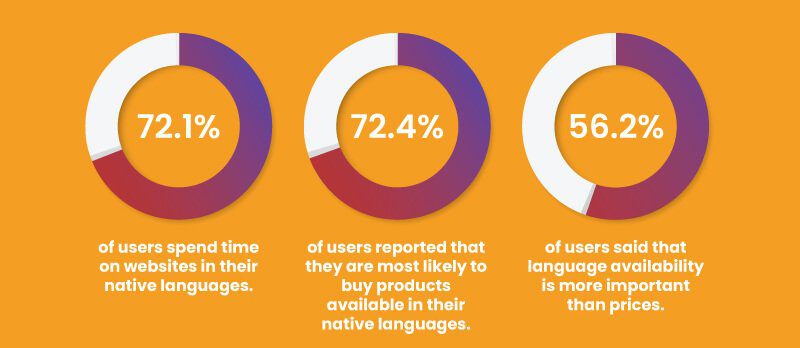
MVL is the process of changing key features of an app to work in a specific market. It usually involves translating the app into the local language. Still, it can also involve making changes to the app to account for cultural differences.
The goal of MVL is to minimize the work required to launch an app in a new market while still providing a good user experience. To do this, MVL focuses on the most important markets and features and then makes incremental improvements over time.
2. Patient/User Engagement
One of the main benefits of healthcare apps localization is that it increases patient engagement and allows patients to take control of their healthcare plans.
But, how can we increase patient engagement if the language barrier remains? Health apps often contain complex medical terminology that can be challenging for patients to understand.
And although many users understand English for instance, they might not feel comfortable with certain medical terminology in a foreign language.
By translating these apps into multiple languages, users can better understand their medical conditions, treatment options, and medications. This can help with better patient engagement and overall health outcomes, while decreasing health disparities, especially in multicultural communities.
3. Regulatory Compliance
We agreed that localization is essential to the users’ needs, but one more thing to consider is regulatory compliance and standards in each country. Many countries require localization of certain products before their release into the market.
For example, the new EU Medical Device regulation necessitates the translation of documents related to any medical device into the 24 European Union languages.
So, localization has to be your best friend if you desire to expand globally and enter new markets that have different regulations in relation to the health and medical industry.
4. Personalized Experiences for Users
| Medication | Commercial Name | Country |
|---|---|---|
| Paracetamol | AcetAdolParamolPanadol | USABahrain, Oman, UAEUK, TaiwanEgypt, Ireland, Malaysia, |
Another noteworthy example is how the majority of dieting apps and calorie counters don’t include any local dishes when expanding to a new market. It could be frustrating to customers because it doesn’t offer them the full benefits of your app and they might end up uninstalling it.
So, localizing medicines’ names or dishes in accordance with the new target market could bring many more customers and lead to loyal ones despite any rising competition.
5. Localization and ROI
All the data we discussed above says one thing: to localize is the answer!
Localization will definitely increase your ROI and guarantee more expansion in local markets. According to “The Impact of App Translations” study, localizing apps leads to 128% more downloads per country. In addition, companies reported a 26% increase in revenue after app localization.
After all, is there any reason to not localize?
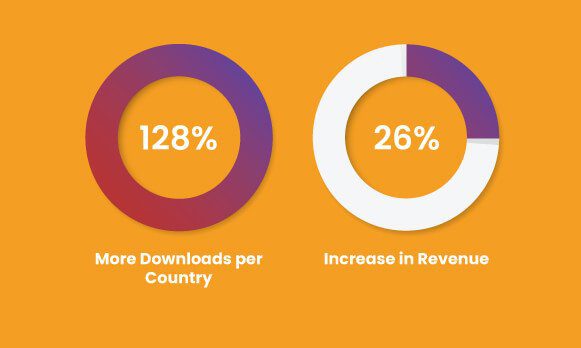
If You Are Looking For a Pocket Guide To
Healthcare Apps Localization
This free white paper is for you.
Healthcare Localization Success Stories
Many companies in the healthcare industry have chosen to localize their apps and their huge success only proves the importance of localization.
Let’s see some success stories!
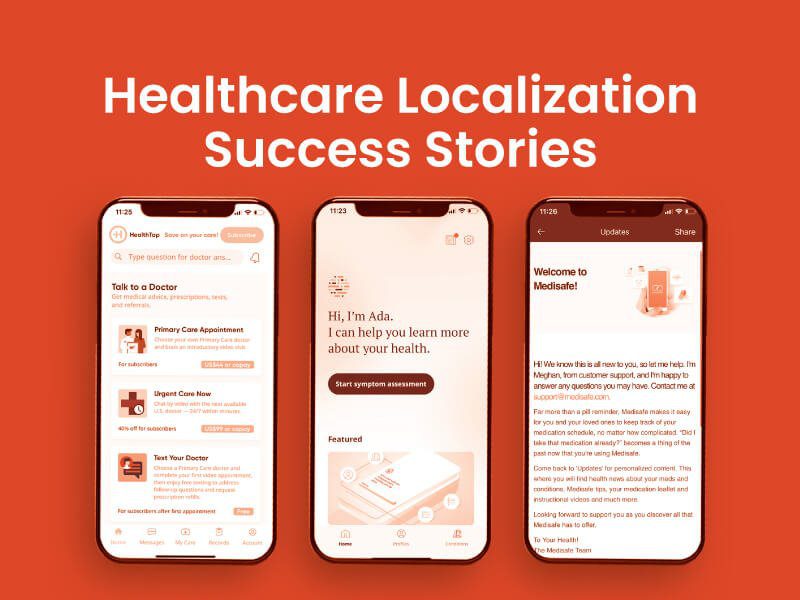
Medisafe
Medisafe is a personalized medication management platform with over 4 million users in 200 countries worldwide.
The app is currently available in 24 languages that go beyond the major world languages. They ranked #1 of 272 among competitor platforms.
Ada Health
Ada Health is a health app that helps users with self-assessment in relation to medical problems. They have 13 million users worldwide and their app is available in 11 languages.
They take extreme pride in their multilingual availability. Their “Medical guidance in your language” motto on their website speaks of inclusivity, localization success, and no health disparities!
HealthTap
Healthtap is a telehealth app for doctors and medical services. They are available in over 100 languages in 174 countries with 350 million visitors or members.
They repeatedly localized their app in different languages, doesn’t that speak of the experience’s success?
Sawatech: A Pioneer Localization Company
Localization is an extremely important step in the direction of global expansion. Success within a new market is highly dependent on the quality of localization. Users nowadays don’t tolerate mistakes, especially in a sensitive industry like healthcare.
That’s why Sawatech only provides you with the best localization services. We have been helping our customers in the healthcare industry expand their businesses since 2003.
We offer end-to-end localization services to help you localize your content into the target language, adapt your UI/UX, provide App Store Optimization (ASO) to rank better, and take charge of any voice-over services your app might need.
We provide flawless quality in 120 African languages within your timeframe.
If you’ve decided to localize your app, we’re here to help.
Ever since the outbreak of Covid-19 pandemic, people have become more concerned about their health. Covid-19 also taught people that there are many ways to keep your health in check. Ways that go beyond visiting your doctor every now and then.
One way that became even more effective and popular during the pandemic is healthcare apps.
People grew more interested in maintaining a healthy lifestyle, and so their interest in different types of healthcare apps grew as well.
In fact, according to PubMed, the number of healthcare apps exceeded the expected growth percentage in the IOS apps market by 29.9% right after the pandemic.

However, the problem persists. Most of those apps are not for everybody, simply because of the language barrier. The content is either in English or the language of the country where the app is developed.
In other words, they might not feature multi-language content, making it tough for people who speak different languages around the world and limiting the growth potential of apps. Accordingly, app owners remain unable to gain valuable ROI within international markets.
If this rings any bells for you, you’ll need to know about healthcare app localization. The approach allows you to take over different markets. If that sounds like something you want, then keep reading!
Types of Healthcare Apps Localizations
There currently are many different Health and Fitness apps in the market that serve different purposes. They aim to provide all kinds of users with health services that suit them.
They provide different services and address many different potential customers. Some of the remarkable examples are:
- Doctor On-Demand Apps
- Doctor’s Appointment Booking Apps
- Medical Record Apps
- Reminder Apps
- Nutrition and Weight Loss Apps
- Fitness Apps
- Women’s Healthcare Apps
- Mental Health Services Apps
- Chronic Diseases Management Apps
- Pharmacy Delivery Apps
Each of these apps serves a different need and would require a different and unique localization plan. No two apps are localized the same!
What Is Healthcare Apps Localization?
Before discussing the importance of localization in the healthcare apps industry, let’s first take a look at localization and understand what it entails.
Many people wonder if translation and localization are the same thing, merely translating the content into another language.
The answer is no, localization is much more than that.
Localization is the process of adapting your app to match the linguistic, cultural, and technical preferences of your target audiences across different regions and countries.
This means that to localize your app, you’ll need medical translation for your app content, DTP publishing and UI/UX localization for the layout and design of your app, and much more.
For instance, localizing your healthcare app will also require the localization of measurement systems, date formats, and different types of images and symbols. That’s because the cultures of different countries influence those aspects, among others, greatly and they vary across different locations.
For example, the USA uses the imperial system, not the metric system, and uses MM/DD/YYYY date format. Those systems aren’t commonly used in other countries and would require localization.
That’s why each localization experience is different from the others.
Localization’s goal is to adapt your product to the different markets, and so the localization plan ought to be flexible and take into account the specific needs of every region and target audience.
To Localize or Not to Localize: 5 Reasons Why You Should Localize Your Healthcare Apps
You might wonder, if healthcare apps are already this successful, why would I choose to localize?
That’s a good question.

1. Native-language Content and Purchasing Behavior
Although Health apps are already so famous, they fill the gaps in some markets more than others. The African Continent for example still needs more healthcare apps in the African languages, so localization gets you way ahead of local competitors.
Another good question is: There are more than 1.5 billion English speakers worldwide, why should I localize my app, then?
Although a great segment of the population speaks English either as a native or second language, the data suggests purchasing decisions are very much related to the content’s language.
Common Sense Advisory surveyed 2430 web users in 8 countries to study the effects of language on purchasing decisions. Their data analysis tells us that:

MVL is the process of changing key features of an app to work in a specific market. It usually involves translating the app into the local language. Still, it can also involve making changes to the app to account for cultural differences.
The goal of MVL is to minimize the work required to launch an app in a new market while still providing a good user experience. To do this, MVL focuses on the most important markets and features and then makes incremental improvements over time.
2. Patient/User Engagement
One of the main benefits of healthcare apps localization is that it increases patient engagement and allows patients to take control of their healthcare plans.
But, how can we increase patient engagement if the language barrier remains? Health apps often contain complex medical terminology that can be challenging for patients to understand.
And although many users understand English for instance, they might not feel comfortable with certain medical terminology in a foreign language.
By translating these apps into multiple languages, users can better understand their medical conditions, treatment options, and medications. This can help with better patient engagement and overall health outcomes, while decreasing health disparities, especially in multicultural communities.
3. Regulatory Compliance
We agreed that localization is essential to the users’ needs, but one more thing to consider is regulatory compliance and standards in each country. Many countries require localization of certain products before their release into the market.
For example, the new EU Medical Device regulation necessitates the translation of documents related to any medical device into the 24 European Union languages.
So, localization has to be your best friend if you desire to expand globally and enter new markets that have different regulations in relation to the health and medical industry.
4. Personalized Experiences for Users
| Medication | Commercial Name | Country |
|---|---|---|
| Paracetamol | AcetAdolParamolPanadol | USABahrain, Oman, UAEUK, TaiwanEgypt, Ireland, Malaysia, |
Another noteworthy example is how the majority of dieting apps and calorie counters don’t include any local dishes when expanding to a new market. It could be frustrating to customers because it doesn’t offer them the full benefits of your app and they might end up uninstalling it.
So, localizing medicines’ names or dishes in accordance with the new target market could bring many more customers and lead to loyal ones despite any rising competition.
5. Localization and ROI
All the data we discussed above says one thing: to localize is the answer!
Localization will definitely increase your ROI and guarantee more expansion in local markets. According to “The Impact of App Translations” study, localizing apps leads to 128% more downloads per country. In addition, companies reported a 26% increase in revenue after app localization.
After all, is there any reason to not localize?

If You Are Looking For a Pocket Guide To
Healthcare Apps Localization
This free white paper is for you.
Healthcare Localization Success Stories
Many companies in the healthcare industry have chosen to localize their apps and their huge success only proves the importance of localization.
Let’s see some success stories!

Medisafe
Medisafe is a personalized medication management platform with over 4 million users in 200 countries worldwide.
The app is currently available in 24 languages that go beyond the major world languages. They ranked #1 of 272 among competitor platforms.
Ada Health
Ada Health is a health app that helps users with self-assessment in relation to medical problems. They have 13 million users worldwide and their app is available in 11 languages.
They take extreme pride in their multilingual availability. Their “Medical guidance in your language” motto on their website speaks of inclusivity, localization success, and no health disparities!
HealthTap
Healthtap is a telehealth app for doctors and medical services. They are available in over 100 languages in 174 countries with 350 million visitors or members.
They repeatedly localized their app in different languages, doesn’t that speak of the experience’s success?
Sawatech: A Pioneer Localization Company
Localization is an extremely important step in the direction of global expansion. Success within a new market is highly dependent on the quality of localization. Users nowadays don’t tolerate mistakes, especially in a sensitive industry like healthcare.
That’s why Sawatech only provides you with the best localization services. We have been helping our customers in the healthcare industry expand their businesses since 2003.
We offer end-to-end localization services to help you localize your content into the target language, adapt your UI/UX, provide App Store Optimization (ASO) to rank better, and take charge of any voice-over services your app might need.
We provide flawless quality in 120 African languages within your timeframe.
If you’ve decided to localize your app, we’re here to help.

